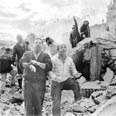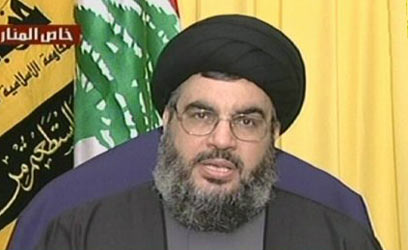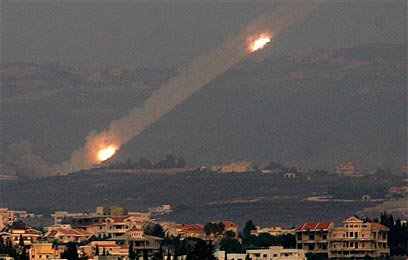
Hezbollah Chief Sheikh Hassan Nasrallah
None
Even as a child, Nasrallah displayed an interest in Islam and dedicated his time to religious studies. When civil war broke out in Lebanon in 1975, he returned with his family to their village, leaving school to join the Shiite Amal organization.
Nasrallah’s talents and diligence stood out at the local mosque, and one of the senior spiritual leaders took him under his wing. At age 16, Nasrallah was sent to a prestigious Muslim seminary in Najaf, the Shiite holy city in Iraq.
During his studies, he was tutored by a senior Lebanese student named Abbas Mousawi, who later became the leader of Hezbollah. The two Lebanese students quickly became friends.
In 1978, Nasrallah and Mousawi fled Iraq in fear of the Iraqi government. Once back in Lebanon, Nasrallah became an instructor at Mousawi’s new seminary in Baalbak, where his reputation as a charismatic and militaristic religious figure grew.
In 1982, at the start of the First Lebanon War, Nasrallah quit Amal and joined the Revolutionary Guards. Within a short time, he was appointed commander of the troops in Bekaa. The Revolutionary Guards encouraged the Lebanese Shiites to develop a new framework called Hezbollah.
Hezbollah's early years were focused on fighting the IDF, and Nasrallah became a dominant military and religious figure within Hezbollah. He led several successful operations against Amal in 1987. Later, Nasrallah traveled to Iran to continue his Islamic studies in the holy city of Kum.
When the fight between Hezbollah and Amal resumed in 1989, Nasrallah left his studies in Iran, and returned to Lebanon to join the fray. He was lightly injured in one of the battles.
Over the next year, Nasrallah became a member of the Shura Council, Hezbollah’s highest institution. During that time, the organization was split between supporters of Syria and supporters of Iran.
In 1991, following negotiations between the two countries, Mousawi, whose loyalties tended towards Syria, was appointed secretary-general. In exchange, Nasrallah, an Iranian supporter, was given more power.
In 1992, the IDF assassinated Mousawi. Nasrallah quickly replaced him, and has been the leader of Hezbollah ever since.
Under his leadership, the organization unleashed a wave of brutal terror attacks against Jewish and Israeli targets throughout the world, which climaxed with the attacks on the Israeli embassy in Buenos Aires in March 1992, which killed 22, and on the city’s Jewish Community Center in July 1994, which killed 80.
The most significant test of Nasrallah’s leadership occurred in 1997, when a group led by Hezbullah’s first secretary-general, Sheik Sobhi Toufeili, declared a “revolution of the hungry” to protest what they perceived as Hezbullah’s abandonment of the Shiite population in Lebanon.
However, Iran and, especially, Syria backed Nasrallah, and the Baalbak-based opposition was forced to submit their weapons and surrender.
In the aftermath of the IDF’s retreat from most of Lebanon in 1985, Hezbollah initiated a determined campaign against the IDF and the Christian South Lebanese Army in the security zone, set up by Israel inside Lebanon close to the international border. During this struggle, Hezbollah’s military capabilities increased, as a result of Nasrallah’s leadership and close ties with Iran.
Nevertheless, the IDF’s significant military superiority meant many more losses for Hizbullah, and from a purely military standpoint, most Hezbollah offensives ended in failure.
Under Nasrallah’s leadership, Hezbollah unveiled a new battlefield: Israeli public opinion. In a number of interviews, Nasrallah declared that he had discovered Israeli society’s weak point, namely a high intolerance for loss of human life. Based on this assumption, the media arena became a central stage for Hizbullah’s anti-Israel activities.
Despite numerous Israeli efforts, Hizbullah managed to successfully conduct guerilla attacks in the security zone, leading to constant Israeli casualties. Concurrently, Hezbollah filmed their operations against the IDF and the SLA; the tapes were distributed worldwide.
Also, Hezbollah worked hard to destroy Israeli morale. For instance, Hezbollah flags were placed on Israeli positions, and IDF and SLA commanders were targeted.
The continued fighting yielded numerous losses on both sides. During the 1990s, as a result of the constant casualties and the feeling that the conflict would never end, the Israeli public indicated that they were no longer willing to pay the price for a continued presence in Lebanon .
Eventually, the government decided to retreat from the Lebanese security zone. In May 2000, the IDF unilaterally retreated to the international border.

Nasrallah televised speech during Second Lebanon War (Photo: AP)
The IDF retreat dramatically improved Nasrallah’s standing within the Arab world, who now perceived him as a hero. In a speech he made to celebrate the retreat, Nasrallah said, “It (Israel) has a nuclear weapon and the strongest air force in the region, but in truth, it is weaker than a spider web.”
According to this “spider web” theory , Israel’s reverence for human life and the hedonistic nature of Israeli society make it weak and unable to sustain continued war and bloodshed.
In Lebanon, Nasrallah worked to improve Hezbollah’s standing within the Shiite community. Thus, a large portion of Hezbollah’s budget was allocated for the establishment of welfare, education, charity and healthcare institutions, whose services were provided free-of-charge to community members.
Even after the IDF retreat, Nasrallah refused to end the fight against Israel , and he continued attacking and insulting Israel in his speeches. In practice, the actual fighting was limited to occasional shootings, while preparations for future conflagrations were accelerated.
On 12 July, 2006, theSecond Lebanon war was ignited when Hezbollah fighters entered Israeli territory, killed three Israeli soldiers, injured two, and captured two others.
At the same time, the organization carried out diversionary rocket attacks on Israeli military positions near the border.
Israeli forces failed to rescue the two kidnapped soldiers; five more Israeli soldiers were killed on Lebanese soil during the attempt.
The next day, Israel responded by bombing the Beirut International Airport, the main Beirut - Damascus highway.
Nasrallah vowed to strike Tel Aviv in retaliation for Israel's barrage of Lebanon's capital, Beirut.
"If you hit Beirut, the Islamic resistance will hit Tel Aviv and is able to do that with God's help," he said in a televised address.
Although Hezbollah did not hit Tel Aviv, by the end of the war, the organization had fired some 3,970 Katyusha rockets into Israel. The majority of rockets landed in Haifa, although a few rockets reached as far south as Hadera.

Rockets fire from Lebanon (Photo: AP)
Despite the fact that Nasrallah was viewed by many as a hero for his leadership during the war, there were also those in Lebanon who criticized him.
Walid Jumblatt, leader of the Progressive Socialist Party of Lebanon and the most prominent leader of the Druze community, said, "Great, so he's a hero. But I'd like to challenge this heroism of his. I have the right to challenge it, because my country is in flames.”
After 34 days of fighting, a ceasefire between Israel and Hezbollah took effect, and Nasrallah declared the organization victorious.
Following the war, Nasrallah said during a televised interview with Lebanon's New TV station, "We did not think, even 1 percent, that the capture would lead to a war at this time and of this magnitude. You ask me, if I had known on July 11 ... that the operation would lead to such a war, would I do it? I say no, absolutely not.”
Nasrallah is married to Fatima Yassin. His oldest son, Hadi Nasrallah, was killed by the IDF in September 1997. His body was brought to Israeli territory and was returned to Lebanon in exchange for the body of a naval commando killed in 1997.
Following his son’s death, Nasrallah was quoted as saying, “Israel should not feel satisfaction at my son’s death, for he died on the battlefield, facing the conquerors as he wished, with a gun in his hand.”










